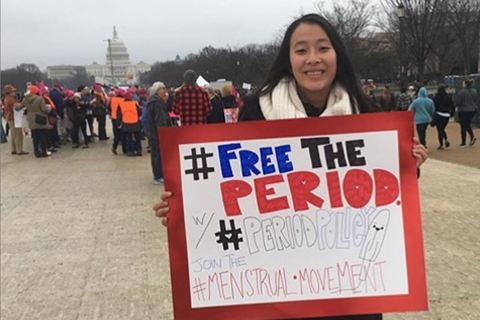Menstrual Equity: How to Get Involved and Create Change in the Period Space
thinx archive
·5 min read

by Team Thinx | 02/01/2017
As the movement of activists fighting for menstrual equity begins to grow stronger, more energy is being put behind making systemic change around ensuring access to menstrual hygiene. If you are reading this, I am assuming that you have been quite engaged in the period movement already, and have heard the phrase “tampon tax” before. The beautiful but challenging thing about these conversations around period equity policies becoming more mainstream is that more people are beginning to learn about the issues as more shareable content is created for social media and other platforms. It is challenging because policy is very intricate, and it is important to know what exactly we are fighting and what solutions we are proposing as the “menstrual warriors” that we may claim to be.
To begin with, there is no such thing as an actual “tampon tax.” Rather, what that term really represents is the fact that in thirty-seven states here in the United States, there is a sales tax that applies to menstrual products. The crazy thing? That sales tax does not apply to products like Rogaine and Viagra. This is not just a problem here in the United States. In the United Kingdom, there is a sales tax of about 5% that applies to menstrual hygiene products but not to razors. So, why are tampons and pads taxed in the first place? I find the answer angering and motivating: because those items are not categorized as a “necessity.” This is why you may have heard this sales tax referred to as the “luxury tax on tampons,” in turn earning the name the “tampon tax.”
I’m Nadya Okamoto, an 18-year-old freshman at Harvard College. In addition to being a THINX brand ambassador on and off my campus, I am also the Founder and Executive Director of Camions of Care. We are a youth-run global nonprofit that strives to provide and celebrate menstrual hygiene through advocacy, education, and service---through the global distribution of menstrual hygiene products and engagement of youth leadership through a nationwide network of campus chapters. In the last two years, we have addressed over 60,000 periods through 43 nonprofit partners in 27 states and 14 countries, and we have 65 campus chapter at universities and high schools around the United States.
In the next couple of months Camions of Care will be launching our policy program. This will consist of a comprehensive toolkit that will connect (youth) activists to legislators to start pushing real systemic change around menstrual equity. The toolkit is intended to make “getting involved” with pushing this policy as easy as possible. This means that we will be providing everything from example legislation to talking points, email templates, sample press releases, and even social media posts to engage your community in joining you. There will be six different pieces of legislation we will be providing for you to engage with, depending on your personal interests or the state you are taking action.
Of course, we will have material to pursue making menstrual products exempt from the sales tax in your state if they aren’t exempt already. Just to name a few: on a local level (particularly in working with your city council) we have orders about making products free in public restrooms, on a federal level we have the Menstrual Product Tax Credit Act and the Menstrual Product Employees Act, and we even have policies you can pass at your school (middle school through university) to make menstrual products free and accessible. The Menstrual Product Tax Credit Act is, in my opinion, probably one of the most daring. It was originally presented by one of my greatest role models, New York Congresswoman Grace Meng. The act would give a sort of allowance to menstruators who qualified, a sort of allowance to specifically afford menstrual hygiene products. Something like this is currently unavailable, and menstrual hygiene products are not covered by programs like food stamps.
I want to end this short entry by leaving you with the video below, which Camions of Care released today. In it a woman named Angie shares her story of dealing with her period when she was 19-years-old and homeless. It is the latest one in a series we are calling #PeriodStories. The goal of the video series was to normalize menstruation, but also bring to light stories of how periods are an equalizer (we all have them if we were born female!) and how for some periods can seriously hold you back. From sharing the story of a woman from Nepal who was socially isolated when she was on her period, to the story of a woman from Sierra Leone who experienced female genital mutilation prompted by her first period, and even the story of a seventh-grade girl fed-up with people being scared to talk about periods, we try to amplify the conversation and break down the stigma that currently surrounds this very natural process.
I have a very emotional response to watching this video, as if the burning passion for menstrual equity within me wants to jump out and hit the ground running trying to fight for adequate access to menstrual hygiene for all. I hope you feel the same way, and that you stay engaged as efforts around pushing period policies amp up.
by Team Thinx


